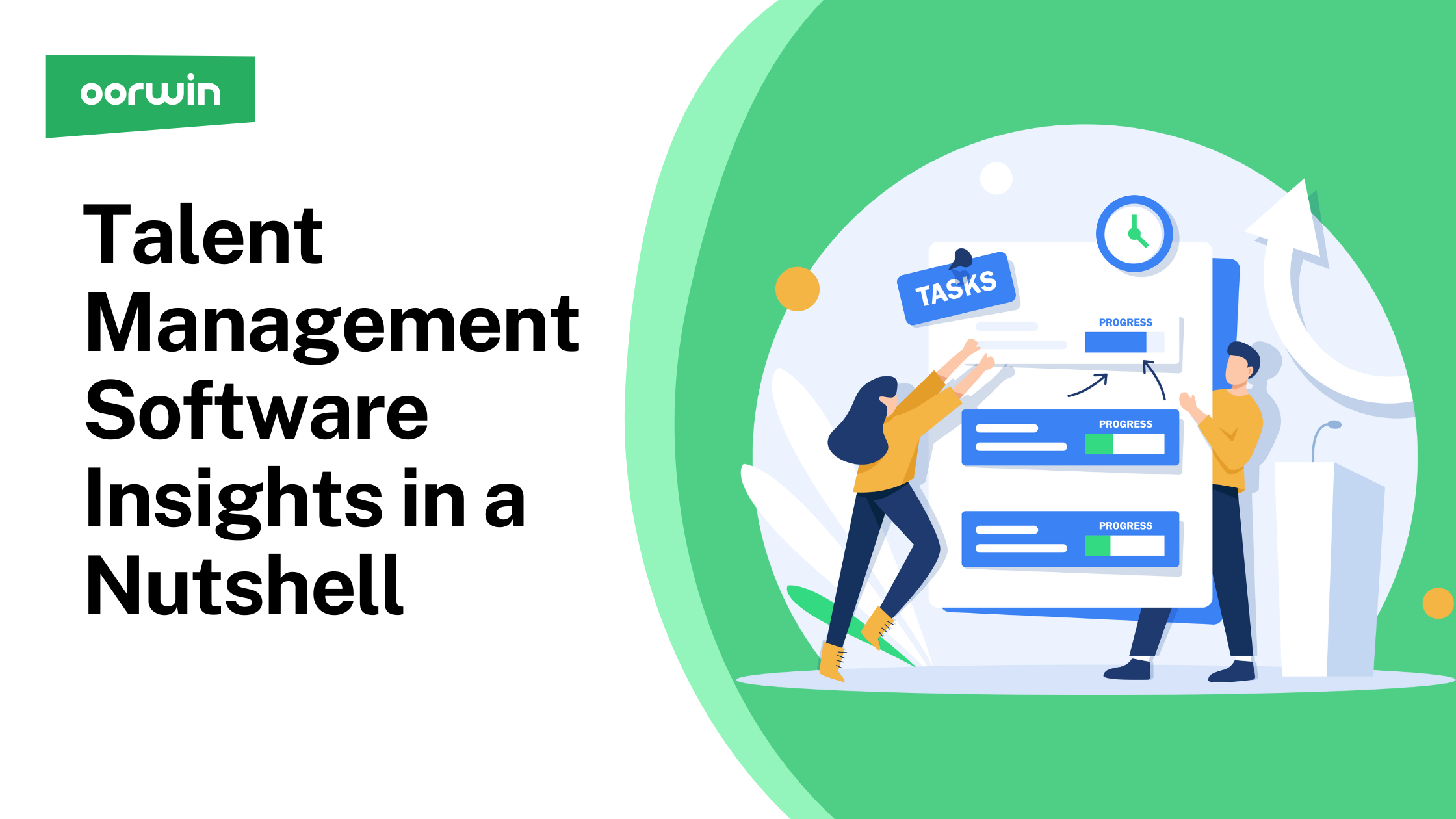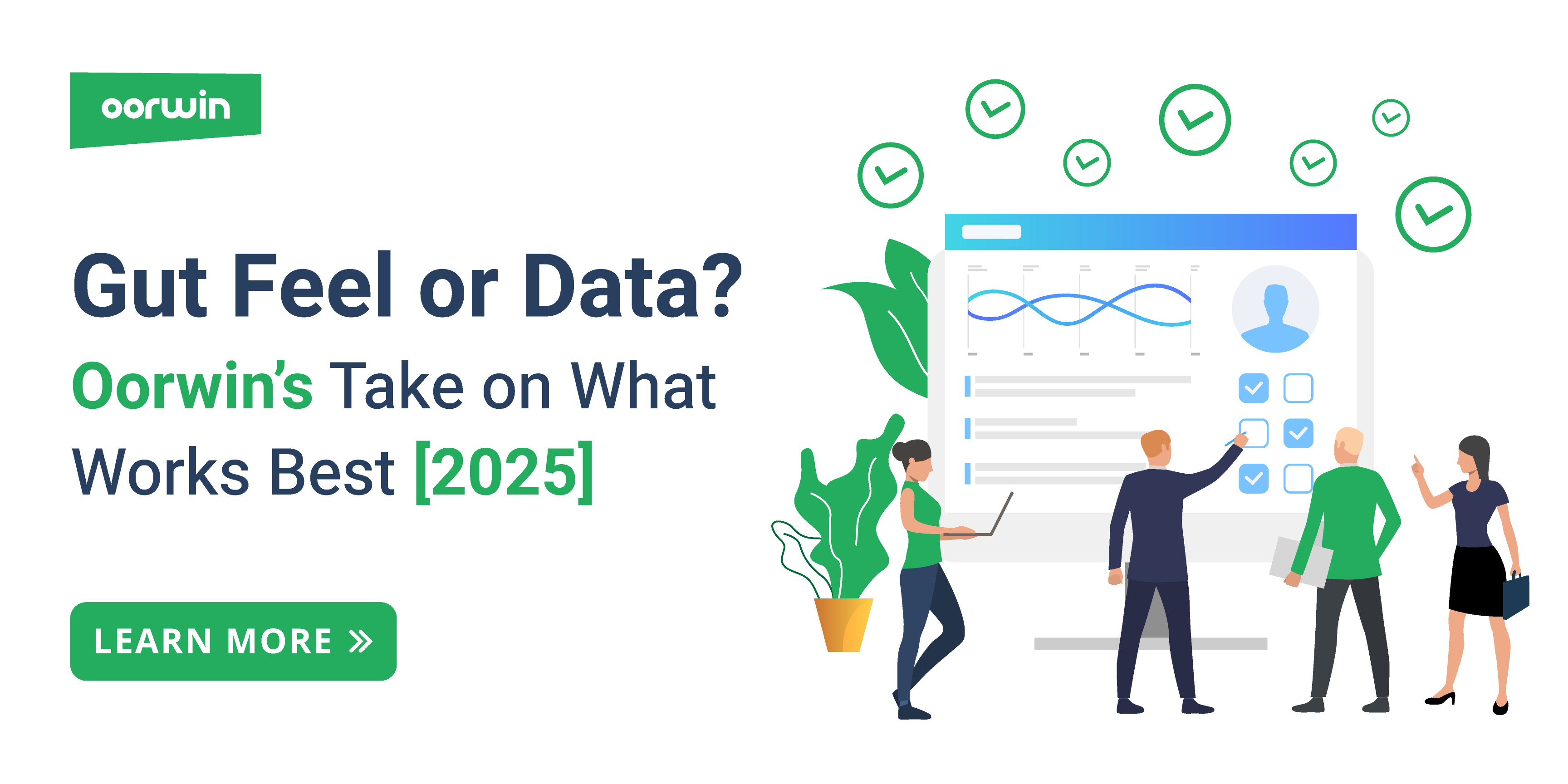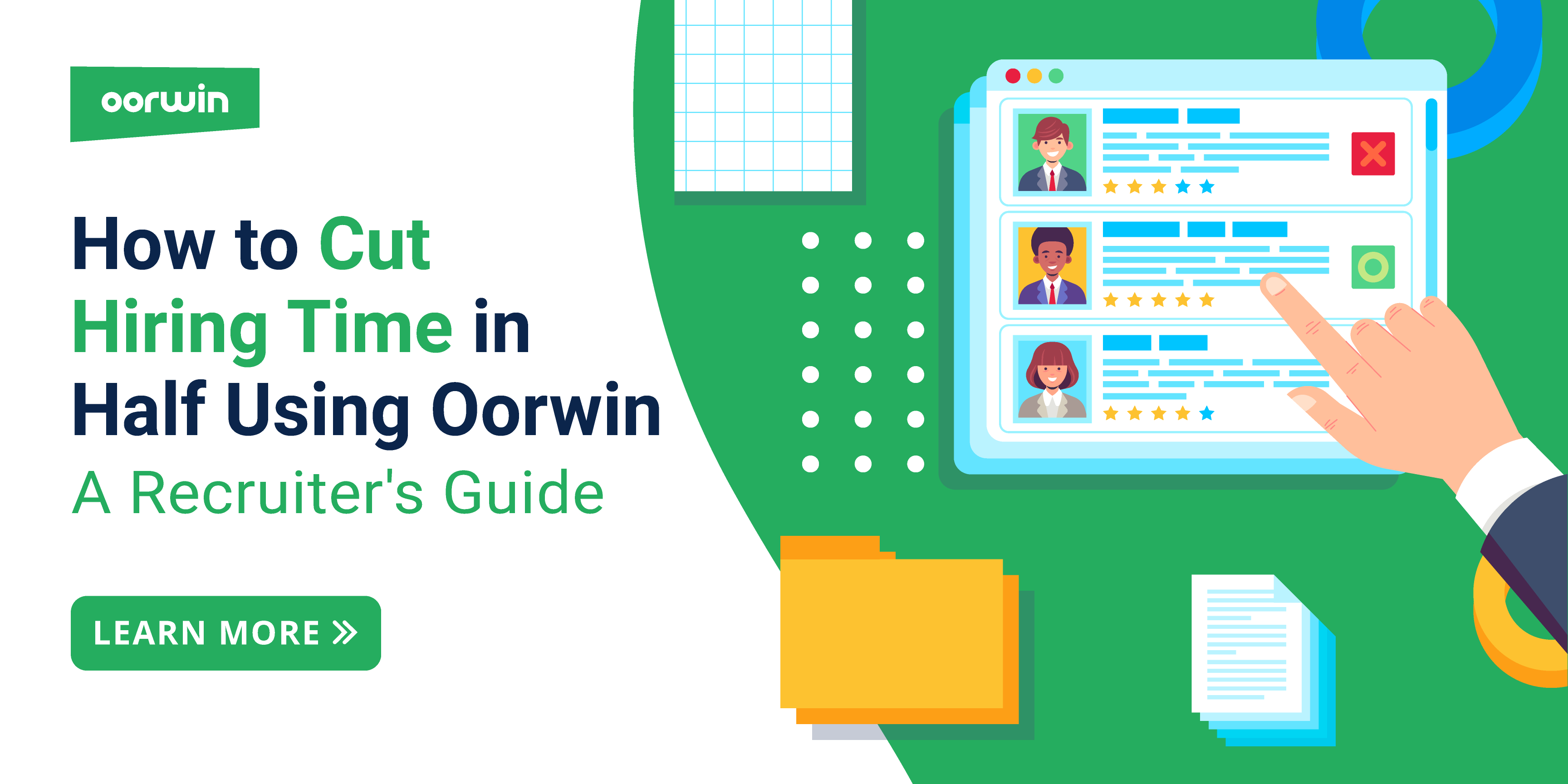Talent Management Software Insights in a Nutshell
Oorwin
8min read / 6 Dec 2023

Related Articles
The Ultimate Guide to Talent Management Systems, Tools, and Software
As the landscape of human resources evolves, Talent Management Software (TMS) has become a pivotal tool for organizational advancement. This guide takes you through the intricate world of TMS, shedding light on its key components, the significant benefits it offers, and its profound impact on HR operations. Delving into how TMS refines everything from recruitment to employee retention, we explore its role in transforming the way organizations approach their most crucial asset – their workforce. Join us to uncover the capabilities of TMS in enhancing HR strategies and fostering business growth.
What is Talent Management?
Talent management is a comprehensive strategy that goes beyond mere recruitment to encompass the entire journey of an employee within an organization. It’s an integrated approach focused on attracting, developing, and retaining talented individuals who can significantly contribute to an organization’s success. This strategy involves a thorough understanding of the employee lifecycle, from initial recruitment and onboarding to professional development, performance management, and succession planning.
Talent management is about placing people in the right roles at the optimal time, aligning their skills and career growth with the organization’s objectives. It also involves creating a supportive work environment that encourages continuous learning and development, ensuring that employees excel in their current roles and are prepared for future challenges. Effective talent management is key to building a resilient, innovative, and competitive workforce that can navigate the complexities of today’s business landscape.
What Does Talent Management Software Mean?
Talent Management Software is a technology that streamlines all aspects of talent management. It’s designed to optimize HR processes, from recruitment and onboarding to performance management and retention.
Comprehensive Platforms vs. Specific Tools
When it comes to Talent Management Software (TMS), organizations have a choice between comprehensive platforms and specific tools, each serving different needs:
Comprehensive Platforms:
All-in-One Solution: These platforms offer a holistic approach, covering every aspect of HR management.
Integration: Seamless integration of various HR functions, from recruitment to retirement.
Consistency: Ensures uniformity in processes and policies across the organization.
Best for: Larger organizations or those seeking an integrated approach to manage all HR activities under one umbrella.
Specific Tools:
Task-Focused: Designed to address specific HR tasks like recruitment, performance evaluation, or employee engagement.
Flexibility: Can be chosen based on the most pressing needs or gaps in the HR processes.
Customization: Offers more specialized features tailored to specific tasks.
Best for: Smaller organizations or those with specific needs in certain areas of HR.
The choice between these two depends largely on the organization’s size, complexity, and specific HR goals.
The Role of TMS in Employee Lifecycle
Talent Management Software (TMS) is vital in managing the employee lifecycle, with tools tailored for each stage:
Hiring Phase:
- Streamlines recruitment from job postings to candidate selection.
- Ensures alignment between job requirements and applicant skills.
Onboarding Stage:
- Facilitates smooth integration of new hires into the organization.
- Provides resources for orientation and initial training.
Employee Development:
- Supports growth with tailored training programs.
- Offers performance management tools for continuous improvement.
Retention:
- Identifies and addresses factors contributing to employee satisfaction and loyalty.
- Helps in maintaining a motivated and committed workforce.
Exit Process:
- Assists in a structured and insightful offboarding experience.
- Ensures a respectful transition for departing employees.
Types of Talent Management Software
Talent Management Software (TMS) comes in various forms, each catering to different aspects of HR solutions, from recruiting to offboarding. Understanding these types can help organizations choose the right software for their needs. Here’s an overview:
Career Management Software:
- Focuses on employees’ career development.
- Helps in strategizing succession planning and management goals.
Employee Engagement Software:
- Tracks employee interaction within the company.
- Collects feedback, gauges sentiments, and promotes job recognition.
Employee Recognition Software:
- Monitors employees’ progress over time.
- Incentivizes achievements with rewards.
Recruiting Software:
- Streamlines the entire hiring process.
- Subcategories include Applicant Tracking Systems (ATS), Recruitment CRM, and more.
Training and eLearning Software:
- Facilitates reskilling and upskilling of employees.
- Includes Learning Management Systems (LMS), Learning Experience Platforms (LEP), etc.
Offboarding Software: Manages paperwork and forms for employee terminations and exits.
The Benefits of Implementing Talent Management Software
Implementing Talent Management Software (TMS) brings many benefits to an organization, transforming how HR functions and interacts with employees. The benefits are as follows:
Enhancing Recruitment Efficiency and Quality
TMS revolutionizes recruitment by automating key processes, from job posting to candidate screening. It efficiently narrows down the candidate pool to the best fit, enhancing the quality of hires. This leads to a more streamlined recruitment process, saving time and resources while ensuring that only the most qualified candidates move forward in the hiring process.
Streamlining the Monitoring of Employee Progress
TMS offers comprehensive tools for tracking and evaluating employee performance continuously. It provides insights into individual achievements and areas for improvement, facilitating personalized development plans. This ongoing monitoring helps recognize high performers and plan for career advancement, ensuring employees are on the right track for growth and success.
Data-Driven Decision-Making in HR Strategies
TMS empowers HR with data analytics, transforming decision-making into a strategic, evidence-based process. It provides actionable insights into various HR functions, from hiring trends to employee turnover rates, enabling HR professionals to make informed decisions that align with employee needs and organizational goals.
Enhancing Cultural Integration and Boosting Employee Engagement
TMS plays a crucial role in fostering a positive workplace culture. It enhances employee engagement by facilitating effective communication and providing platforms for feedback. This helps align employees with the company’s core values and mission, creating a more cohesive and motivated workforce.
Retain Top Talent
TMS is instrumental in retaining top talent by offering deep insights into employee satisfaction and career aspirations. It helps identify what drives employee engagement and loyalty, enabling organizations to implement strategies that keep their best talent motivated and committed, thereby reducing turnover and fostering a stable, skilled workforce.
Overcoming Challenges in Talent Management Software Implementation
Implementing Talent Management Software (TMS) can be complex, with several challenges that organizations need to navigate. Each challenge requires careful consideration and strategic planning, from integration issues to ensuring user adoption. Addressing these challenges effectively is key to unlocking the full potential of TMS.
Addressing Integration with Existing Systems
One of the key challenges is integrating TMS with existing HR systems. Choosing a platform that can seamlessly integrate with current systems is crucial.
Managing Data Security and Privacy Concerns
Data security and privacy are paramount. Selecting a TMS that adheres to compliance standards and offers robust data protection is essential.
Balancing Cost with Return on Investment
While implementing TMS involves upfront costs, the long-term ROI regarding efficiency and talent retention should be considered.
Navigating Customization and Scalability Issues
Choosing a TMS that offers customization and scalability is important to meet the organization’s evolving needs.
Ensuring User Adoption and Training
Successful implementation requires user adoption and proper training. Selecting user-friendly TMS and providing comprehensive training is key.
Key Features to Look for in Talent Management Software Before Investing
Selecting the right Talent Management Software (TMS) involves understanding which features will most effectively support and enhance your organization’s HR practices. The ideal TMS should align with your current needs and adapt to future changes. Let’s explore the essential features that can significantly impact your TMS investment.
Talent Relationship Management
Talent Relationship Management is pivotal in fostering strong connections with both current employees and potential candidates. This feature enables organizations to engage effectively with their talent pool, track candidate interactions, and build lasting relationships, essential for recruitment and retention strategies.
Compensation Management
An effective compensation management feature is vital for attracting and retaining top talent. It ensures fair and competitive compensation practices, aligns pay structures with market standards, and manages bonuses and incentives, contributing to employee satisfaction and loyalty.
Recruiting and Onboarding
Features that streamline the recruitment and onboarding process are critical. They simplify hiring workflows, enhance candidate experience, and ensure new hires are efficiently integrated into the organization. This includes applicant tracking, interview scheduling, and automated onboarding tasks.
Platform Compatibility and Integration
Compatibility and smooth integration with existing systems are essential for a seamless transition to a new TMS. This feature minimizes disruptions in HR processes and ensures data consistency across platforms, facilitating a unified approach to talent management.
Employee Engagement
Tools for measuring and enhancing employee engagement are key to maintaining a motivated workforce. This includes features for regular feedback, employee surveys, and recognition programs that help understand and improve employee morale and engagement levels.
Learning Management
A robust learning management feature supports continuous employee development and skill enhancement. It should offer a range of training modules, e-learning opportunities, and career development plans, fostering a culture of continuous learning and growth.
Mobile Capabilities
Mobile functionality is increasingly important for accessibility and convenience. A mobile-friendly TMS allows employees and HR professionals to access information and perform tasks on the go, enhancing flexibility and responsiveness.
Performance Management
Effective performance management features are crucial for tracking and evaluating employee performance. This includes goal setting, performance reviews, and feedback mechanisms, essential for identifying development needs and recognizing achievements.
Maximizing Business Potential with the Right Talent Management Software
Choosing the right Talent Management Software enhances your business’s growth and efficiency. A well-suited TMS streamlines HR processes effectively manages talent, and aligns workforce development with your organizational goals. It’s a strategic tool that simplifies day-to-day operations and fosters long-term success by building a strong, skilled, and motivated workforce.
Here, Oorwin stands out as a comprehensive solution. Oorwin’s TMS is designed to meet the diverse needs of modern businesses, offering a blend of advanced features and ease of use. By integrating Oorwin into your HR strategy, you can elevate your talent management to new heights, ensuring your business is well-equipped to meet its objectives. Explore Oorwin’s capabilities and see how it can drive your organization toward greater success.
FAQ
What does Talent Management software do?
Talent Management software assists in recruiting, training, performance evaluation, and retention strategies for employee development and organizational growth.
What types of Talent Management Software are available?
Available types include applicant tracking systems, performance management tools, learning management systems, and succession planning tools.
Can Talent Management Software be customized to fit specific company needs?
Yes, many Talent Management Software solutions offer customization options to align with specific company requirements and processes.
Popular Articles..
Blog

10min read / 25-Jun-2025
Master Effective Interview Techniques with Oorwin: A Step-by-Step Recruiter’s Guide
Blog
Blog
Get the latest Oorwin releases, updates, success stories & industry news
 Back
Back
